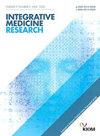正念为基础的干预成人2型糖尿病:系统回顾和荟萃分析
IF 3
4区 医学
Q2 INTEGRATIVE & COMPLEMENTARY MEDICINE
引用次数: 0
摘要
背景2型糖尿病(T2DM)可导致大血管和微血管并发症。正念干预(MBIs)可以改善T2DM患者的代谢和心理健康。我们的目的是评估mbi治疗T2DM的疗效。方法:我们使用包括一位信息科学家在内的多学科团队开发的综合检索策略,检索了5个数据库和2个试验注册库。我们纳入了随机对照试验(RCTs),研究mbi对成年T2DM患者的重要临床结果,包括心理结果、生活质量、血糖控制和心血管危险因素的影响。在可能的情况下,进行随机效应荟萃分析。采用推荐、评估、发展和评价分级(GRADE)方法评估证据的确定性。结果纳入31项随机对照试验(2337名受试者:干预1107名,对照组1230名)。我们发现非常低确定性的证据表明mbi可以减轻压力(标准化平均差(SMD) -1.01,可信区间(CI) -1.91至-0.20,8项试验,n = 528),抑郁(SMD -1.26, CI -2.08至-0.43;7项试验,n = 570)和焦虑(SMD -0.67, CI -1.27至-0.08;4项研究,n = 255)在治疗结束时与等候名单对照/常规护理相比。与等候名单对照/常规治疗相比,mbi对治疗结束时HbA1c和收缩压/舒张压的影响较小(HbA1c平均差值(MD) -0.44, 95 % CI -0.71至-0.17,9项试验,n = 734;低确定性证据)。有非常低的确定性证据表明,与单独的生活方式相比,mbi +生活方式可能对HbA1c或体重没有影响。结论:mbis对成人2型糖尿病患者可能有临床益处(尤其是心理上的),但缺乏确定性的证据妨碍了临床推荐。cochrane系统评价数据库,DOI: 10.002 /14651858. cd014881。本文章由计算机程序翻译,如有差异,请以英文原文为准。
Mindfulness-based interventions for adults with type 2 diabetes mellitus: A systematic review and meta-analysis
Background
Type 2 diabetes mellitus (T2DM) can lead to macro- and microvascular complications. Mindfulness-based interventions (MBIs) may improve metabolic and psychological health in individuals with T2DM. We aimed to assess the efficacy of MBIs for management of T2DM.
Methods
We searched five databases and two trial registries using a comprehensive search strategy developed by a multidisciplinary team including an information scientist. We included randomised controlled trials (RCTs) investigating MBIs for important clinical outcomes including psychological outcomes, quality of life, glycaemic control and cardiovascular risk factors in adults with T2DM. Where possible, random effects meta-analyses were conducted. The Grading of Recommendations, Assessment, Development, and Evaluation (GRADE) approach was used to assess certainty of the evidence.
Results
We included 31 RCTs (2337 participants: 1107 intervention, 1230 control). We found very low certainty evidence that MBIs may reduce stress (standardized mean difference (SMD) –1.01, confidence interval (CI) –1.91 to –0.20, 8 trials, n = 528), depression (SMD –1.26, CI –2.08 to –0.43; 7 trials, n = 570) and anxiety (SMD –0.67, CI –1.27 to –0.08; 4 studies, n = 255) at end of treatment compared to waitlist control/usual care. MBIs may have a small effect on HbA1c and systolic/diastolic blood pressure at end of treatment compared to waitlist control/usual care (HbA1c mean difference (MD) –0.44, 95 % CI –0.71 to –0.17, 9 trials, n = 734; low certainty evidence). There was very low certainty evidence that MBIs + lifestyle may have no effect on HbA1c or body weight compared to lifestyle alone.
Conclusion
MBIs may have clinical benefits (particularly psychological) for adults with T2DM, but lack of certainty in the evidence precludes clinical recommendations.
Protocol registration
Cochrane Database of Systematic Reviews, DOI: 10.1002/14651858.CD014881.
求助全文
通过发布文献求助,成功后即可免费获取论文全文。
去求助
来源期刊

Integrative Medicine Research
Medicine-Complementary and Alternative Medicine
CiteScore
6.50
自引率
2.90%
发文量
65
审稿时长
12 weeks
期刊介绍:
Integrative Medicine Research (IMR) is a quarterly, peer-reviewed journal focused on scientific research for integrative medicine including traditional medicine (emphasis on acupuncture and herbal medicine), complementary and alternative medicine, and systems medicine. The journal includes papers on basic research, clinical research, methodology, theory, computational analysis and modelling, topical reviews, medical history, education and policy based on physiology, pathology, diagnosis and the systems approach in the field of integrative medicine.
 求助内容:
求助内容: 应助结果提醒方式:
应助结果提醒方式:


